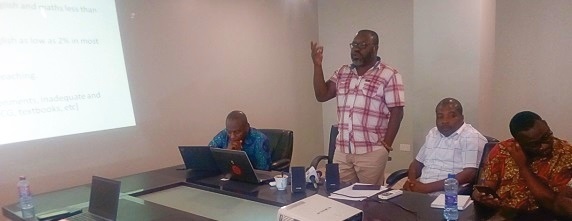
Coalition calls on political parties to denounce PPP in education
The Coalition of Teacher Unions Against the Privatisation of Education in the country says it will commit political parties, especially the New Patriotic Party (NPP) and the National Democratic Congress (NDC) to denounce public private partnership (PPP) in education.
According to the coalition, it would make PPP, which it sees as privatisation, a priority education policy issue on the political agenda during the election season.
Advertisement
“We intend to campaign against political parties who would have PPP modules in their manifestos. We won’t wait until they win and then come and campaign,” the
Executive Director of the Africa Education Watch, a member of the coalition, Mr Kofi Asare, said this at a Media Orientation on PPP in Education in Accra yesterday.
Effects
Mr Asare said PPP had the potential to undermine the right to education, was expensive, discriminatory, excluded the poor’s access to education and interfered with teacher collective bargaining, affects teacher quality and abuse of labour rights, among other things.
Other members of the coalition are the National Association of Graduate (NAGRAT), Ghana National Association of Teachers (GNAT), the Teacher and Educational Workers Union (TEWU) and the Coalition of Concerned Teachers (CCT).
PPP is an arrangement between public and private actors for the delivery of goods, services and facilities such as education.
A PPP in education can be any collaboration between the private sector and the state, whether to produce textbooks, build school infrastructure, or design learning software.
However, most often in policy circles, the term “education PPPs” refers to a partnership with the private sector or non-state sector for the provision of education service.
Dialogue
Mr Asare, who is the Chairman of the Ghana National Education Campaign Coalition (GNECC), said the coalition would have dialogue sessions with the NPP and the NDC, use the media to generate public and stakeholder discourse on how education PPPs could affect access, quality and equity.
“We would put pressure on political parties to increase their funding for public education. If government increases funding for public basic education, there would not be the need to undertake PPP,” he said.
Why PPP?
Mr Asare said the World Bank was actively advising countries to expand private education provision through PPPs and thereby reducing regulations and encouraging the expansion of for-profit schools with the objective of improving learning outcomes to promote an innovative solution to the challenges in public education delivery.
The other ends, he said, were: to promote greater efficiency, wider access to education particularly for excluded households, higher test scores, and greater choice for households.
Mr Asare noted that the coalition would on October 11, 2019, launch an education inequality report.
The Inequality Programmes and Campaign Manager of Oxfam in Ghana, Mr Zakariah Sulemana, said all the dangers of PPP affected girls and women.




